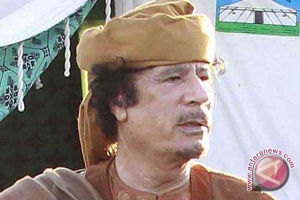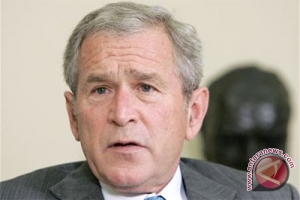
A Pakistani soldier is seen searching the building of a compound following a firefight, in Abbottabad on May 2, 2011 in this still image taken from video footage. — Reuters pic
ABBOTTABAD, Pakistan, May 4 — The United States vowed yesterday to "get to the bottom" of whether Pakistan helped Osama bin Laden elude a long manhunt before he was killed in a US raid, even as Islamabad denied it gave shelter to the al Qaeda leader.
The White House also released more details about the killing of the world's most-wanted man, including that bin Laden was unarmed when he was shot at least once in the head by a US commando.
President Barack Obama's press secretary, Jay Carney, insisted the al Qaeda leader resisted — although he would not say how — when US forces stormed his compound north of Islamabad and engaged in a firefight there. Officials were still debating whether to release a "gruesome" picture of his body.
Washington kept Pakistani officials in the dark about the special forces assault carried out on Monday, fearing they might "alert the targets" and jeopardise the mission, which ended with bin Laden's death, CIA Director Leon Panetta told Time magazine.
The revelation that bin Laden had holed up in a fortified compound in the military garrison town of Abbottabad, possibly for five to six years, prompted many US lawmakers to demand a review of the billions of dollars in aid Washington gives to nuclear-armed Pakistan.
Pakistani President Asif Ali Zardari, issuing his first response to questions about how bin Laden was able to live undetected for so long near the capital Islamabad, did little to dispel suspicions.
"Some in the US press have suggested that Pakistan lacked vitality in its pursuit of terrorism, or worse yet that we were disingenuous and actually protected the terrorists we claimed to be pursuing," Zardari wrote in the Washington Post. "Such baseless speculation ... doesn't reflect fact."
It was the first substantive public comment by any Pakistani leader on the airborne raid that killed the al Qaeda leader, who had become the face of Islamist militancy since masterminding the September 11, 2001 attacks on the United States.
Pakistan has come under intense international scrutiny since bin Laden's death, with questions on whether its security agencies were too incompetent to catch him or knew all along where he was hiding, and even whether they were complicit.
"It would be premature to rule out the possibility that there were some individuals inside of Pakistan, including within the official Pakistani establishment, who might have been aware of this," White House counterterrorism chief John Brennan told National Public Radio.
"We're not accusing anybody at this point, but we want to make sure we get to the bottom of this," he said.
Reflecting a US-Pakistani alliance strained by years of mistrust, Islamabad was not told about the raid until after all US aircraft were out of Pakistani airspace.
At the same time, killing bin Laden — who became the epitome of evil for many Americans as architect of the 2001 attacks on New York and Washington — has given Obama a popularity boost at home where his standing had been eroded by economic woes and high gasoline prices.
About four in 10 Americans say their opinion of Obama improved after he ordered the bin Laden raid. But the bump in his ratings could be short-lived as voters focus again on domestic concerns crucial to his 2012 re-election prospects.
Obama may face more pressure to speed the planned withdrawal this July of some US forces from the unpopular war in Afghanistan.
The White House was also wrestling with releasing what it called a "gruesome" image of bin Laden's corpse — a move that could quell any doubts in the Muslim world on whether he was dead and also give closure to Americans nearly a decade after the 2001 attacks. But critics say such photos could also offend Muslim sensibilities and be exploited by extremists.
White House Press secretary Carney, cautioned: "There are sensitivities here in terms of the appropriateness of releasing photographs of Osama bin Laden."
The Afghan Taliban challenged the truth of bin Laden's death, saying Washington had not provided "acceptable evidence to back up their claim" that he had been killed.
No photos or video of bin Laden's swift burial at sea have been released.
CALLS FOR REVIEW OF US AID
While Islamabad hailed the killing of bin Laden as an important milestone in the fight against terrorism, Pakistan's foreign ministry expressed "deep concerns" that the operation was carried out without informing it in advance.
Pakistan, which for years has said it did not know bin Laden's whereabouts, said it had been sharing information about the targeted compound with the CIA since 2009.
"He was not anywhere we had anticipated he would be but now he is gone," Zardari said, crediting a "decade of cooperation and partnership between the United States and Pakistan."
Irate US lawmakers, already doubtful of Pakistan's cooperation against al Qaeda, demanded to know how it was possible for bin Laden to live near a military training academy without anyone in authority knowing about it.
They said it was time to review aid to Pakistan. The US Congress has approved $20 billion for Pakistan in direct aid and military reimbursements partly to help Islamabad fight militancy since al Qaeda's strikes on the United States.
"Our government is in fiscal distress. To make contributions to a country that isn't going to be fully supportive is a problem for many," said Senate Intelligence Committee Chairwoman Dianne Feinstein.
Prime Minister David Cameron told BBC radio Britain would keep working with Pakistan to combat militancy, but insisted bin Laden "must have had a support network in Pakistan" and that Islamabad must answer questions on the subject.
Even as the White House and Congress stepped up pressure on Pakistan for a full accounting, there was a sense in Washington that the US-Pakistani counterterrorism partnership — already badly frayed — was too vital to fail altogether.
And some lawmakers urged caution, warning that an aid cutoff would be counterproductive.
In Islamabad, there was mostly a sense of embarrassment or indifference that bin Laden had managed to lie low for so long. "The failure of Pakistan to detect the presence of the world's most-wanted man here is shocking," the daily News said in an editorial, reflecting the general tone in the media.
Pakistan, where anti-US sentiment runs high, has a long history of nurturing Islamist militants in the interests of its strategic objectives, primarily facing up to what it sees as its biggest threat — India.
In the first sign militants were attempting to strike back, Afghan forces killed and wounded 25 foreign fighters after they crossed the border from Pakistan, a government official said.
Bin Laden's death had initially boosted the dollar and shares in belief his killing reduced global security risks. But shares dipped yesterday and the dollar struggled to pull away from a three-year low as markets refocused on a fragile global economy and corporate earnings prospects. Still, the threat of revenge attacks could support oil prices, analysts said. — Reuters
Full Feed Generated by Get Full RSS, sponsored by USA Best Price. 




 Porsche mengklaim kendaraan barunya bisa menempuh jarak hampir 750 mil (kira-kira 1.200 km) dengan Panamera diesel baru. Rincian tersebut diumumkan pekan ini menjelang penjualan di Inggris mulai bulan Agustus. Model baru itu menampilkan mesin Porsche yang disetel VW Group 3.0 liter motor ...
Porsche mengklaim kendaraan barunya bisa menempuh jarak hampir 750 mil (kira-kira 1.200 km) dengan Panamera diesel baru. Rincian tersebut diumumkan pekan ini menjelang penjualan di Inggris mulai bulan Agustus. Model baru itu menampilkan mesin Porsche yang disetel VW Group 3.0 liter motor ...
 Sending your message
Sending your message